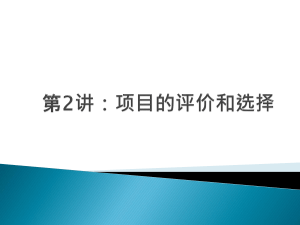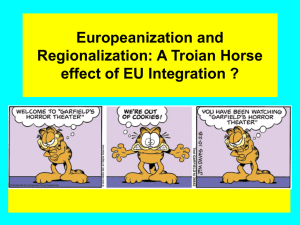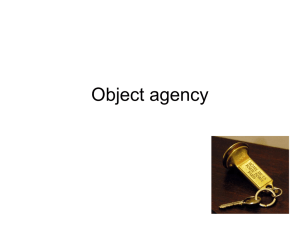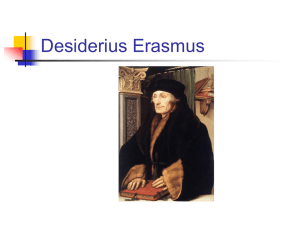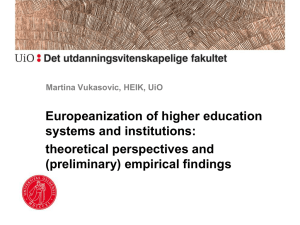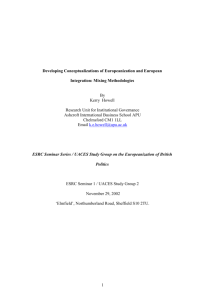2012 09 Austrian Document
advertisement
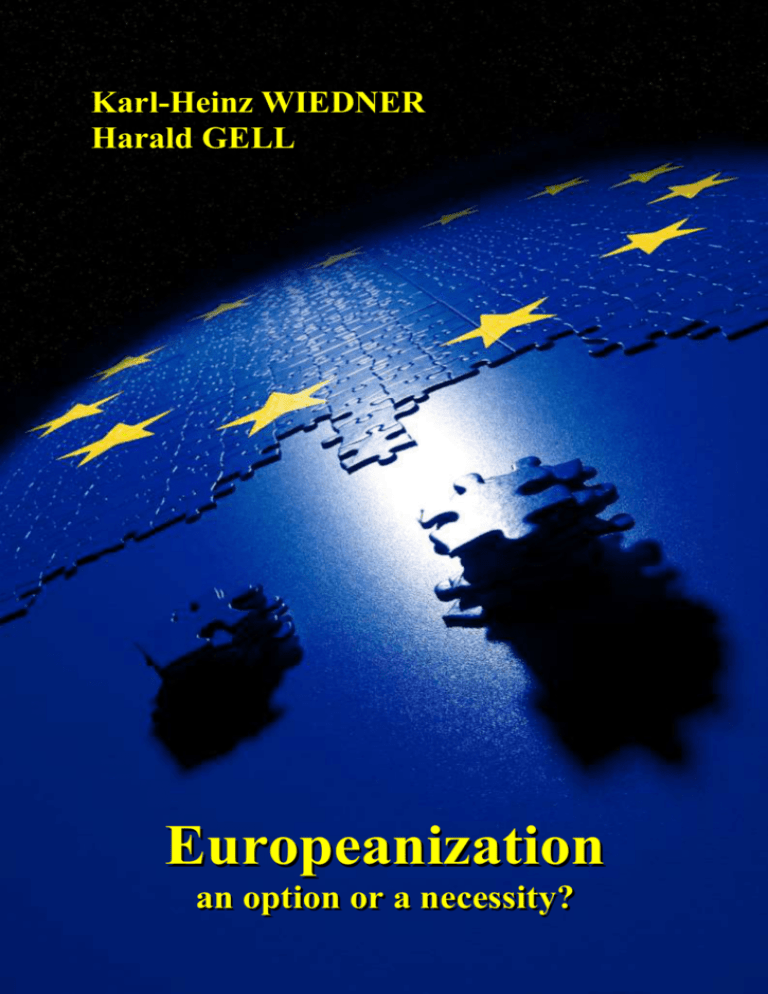
Europeanization – an option or a necessity? Wiedner, Gell Karl-Heinz WIEDNER Harald GELL Europeanization an option or a necessity? Page Europeanization – an option or a necessity? Wiedner & Gell GAUDEO DISCERE UT DOCEAM (Seneca) Page 2 of 27 Europeanization – an option or a necessity? Wiedner & Gell Europeanization – an option or a necessity? Publication for the International Conference at the Military Academy of the Land Forces (MALF) in WROCLAW / POLAND from 12th to 14th September, 2012 Original Address: Wyższa Szkoła Oficerska Wojsk Lądowych imienia generała Tadeusza Kościuszki ul. Czajkowskiego 109 51 - 150 Wrocław NIP: 896-10-00-117 http://www.wso.wroc.pl/ Authors: Karl-Heinz WIEDNER Head of the Department for Military Leadership (Bachelor Studies of Applied Science in Military Leadership) Army-Colonel of General Staff Magister Burgplatz 1 Theresan Military Academy AUSTRIA karl-heinz.wiedner@bmlvs.gv.at Harald GELL Head of the International Office (Bachelor Studies of Applied Science in Military Leadership) Army-Colonel Doctor of Security Research Master of Science Master of Business Administration Master of Security and Defence Management Burgplatz 1 Theresan Military Academy AUSTRIA harald.gell@bmlvs.gv.at WROCLAW September 2012 Page 3 of 27 Europeanization – an option or a necessity? Wiedner & Gell Table of contents 1. 2. Table of contents 4 Abstract 5 Keywords 5 Introduction 6 European Union’s security risks and threats in the 21st Century 7 1.1 European Security Strategy (ESS) 7 1.2 Report on the Implementation of the European Security Strategy 8 1.3 Essential Statements and Analysis 8 1.4 How to react? 9 Way to a European Basic Officer Education 11 2.1 ERASMUS 11 2.2 Bologna Process 12 2.2.1 Development of the Bologna Process 12 2.2.2 Goals of the Bologna Process 12 2.2.3 Benefits from the Bologna Process for Basic Officer Education 14 2.3 European Initiative for the exchange of young officers inspired by ERASMUS (“The Initiative”) 3. 16 2.3.1 Way leading to the Initiative 16 2.3.2 Lines of Development (LoD) 18 Austrian Approach to Europeanization / Internationalization 22 3.1 Outgoing Activities 22 3.2 Incoming Activities 23 4. Conclusion 26 5. Literature 27 5.1 Official papers, elaborations and theses 27 5.2 Homepages 27 Page 4 of 27 Europeanization – an option or a necessity? Wiedner & Gell Karl-Heinz WIEDNER 1 Harald GELL 2 Europeanization – an option or a necessity? Abstract: Europe faces challenges which probably cannot be solved by one country alone. Is there a need for closer cooperation in the future? Is there a need for closer cooperation within the Armed Forces? Which avenues of approach exist? Which avenues of approach should be developed in the future? This paper should give an answer to all these questions. At the beginning high-level strategy papers are analysed, then possible ways to a European Officer Education are described. How civilian exchange programmes could be used for military institutions and how the work of the Implementation Group in Brussels dealing with cadets’ exchanges is delineated later on. Finally the Austrian approach to Europeanization is listed and the answer to the title question will be given. Keywords: ESS (European Security Strategy), CSDP (Common Security and Defence Policy), European Forces, Basic Officer Education, Cooperation, pooling & sharing, EMILYO (Exchange of Military Young Officers), ERASMUS, Bologna-Process, (IG) Implementation Group, Common Modules. 1 Army-Colonel of General Staff, Magister, Karl-Heinz WIEDNER, Theresan Military Academy-Austria, karl-heinz.wiedner@bmlvs.gv.at. 2 Army-Colonel, Doctor of Security Research, Master of Science, Master of Business Administration, Master of Security and Defence Management, Harald GELL, Theresan Military Academy-Austria, harald.gell@bmlvs.gv.at. Page 5 of 27 Europeanization – an option or a necessity? Wiedner & Gell Introduction After World War II Europe’s security was dominated by two blocks; NATO (North Atlantic Treaty Organization) and the Warsaw Pact (Warsaw Treaty Organization of Friendship, Cooperation, and Mutual Assistance). Their approach to the security of the continent was a “philosophy of deterrence” with a possibility of mutual multiple destruction because of their nuclear weapons arsenals. In Western Europe NATO concentrated on military affairs whereas the European Community (later: European Union) concentrated on economic affairs leading to an economic union with an increasing number of Member States (MS). Starting with 1989 this situation has changed dramatically. The Warsaw Pact began to dissolve and the Soviet Union disintegrated. Europe’s territory provided the scene with violence and bloodshed again when Yugoslavia collapsed. It started on the 28th of June 1991 with the “Ten-Day War” in Slovenia.3 Later the conflict was aggravated by genocides in Croatia, Bosnia-Herzegovina and Kosovo. During those days European Union (EU) was neither willing nor able to solve the conflicts; NATO had to intervene with air and land forces.4 Because of those experiences EU started to involve the MS in a so-called “Integration in Security-Policy” with the effect for the Armed Forces that their spectrum of tasks changed categorically. If tasks for the military are to change, what is the effect on military education, especially on the officer education? Are officers ready to master their future challenges or do we still educate them in “traditional” tasks? Do we educate them in European Security Policy or is there not a need to do so at all? Is Internationalization during the Basic Officer Education a necessity or is it an add-on just for fun? Is it a need-to-have item on the European agenda or just a nice-to-have one? Based on Europe’s challenges for the 21st century in the fields of security policy, Remark of the authors: During this war the authors participated with the Austrian Armed Forces in a “border security operation”. 3 4 Remark of the authors: Both authors served with the Austrian Contingents in Croatia, Bosnia-Herzegovina and Kosovo. Page 6 of 27 Europeanization – an option or a necessity? Wiedner & Gell leading to the necessities for Basic Officer Education, this paper should give an answer to the questions above. An answer to the question “how to do it” should be given too.5 1. European Union’s security risks and threats in the 21st century “Large-scale aggression against any Member State is now improbable. Instead, Europe faces new threats which are more diverse, less visible and less predictable”.6 The quotation is taken from the European Security Strategy (ESS) – A Secure Europe in a better World, it expresses Europe’s situation nowadays. This document and a lot of other ones which all are backed by all European Union Member States are pointing the way towards an increasing cooperation and, based on that, towards consequences for the Basic Officer Education in Europe. Essential points of all these documents are listed below: 1.1 European Security Strategy (ESS) In the 21st century the most dangerous threats for Europe are the following: Terrorism, proliferation of weapons of mass destruction, regional conflicts, state failure and organised crime. All the listed threats could be mutually linked, that’s why they turn more and more dangerous and more and more incalculable.7 Remark of the authors: Both authors are Austrian representatives in the so-called „Implementation Group“ (IG) of the European Security and Defence College in Brussels. This group started its work in 2009 with the aim of facilitating Internationalization for the EU Basic Officer Education. The work contains (among other responsibilities) topics in the fields “necessary content of an education for a European Officer” as well as “facilitation of administrative affairs”. All the fields the IG is working on are listed in chapter 2.3.2. 5 6 European Union, European Security Strategy (ESS), Brussels 2003, p. 3. 7 Ibid, pp. 3-5. Page 7 of 27 Europeanization – an option or a necessity? Wiedner & Gell 1.2 Report on the Implementation of the European Security Strategy To the above mentioned threats the following ones are added in 2008: Cyber security, energy security and climate change.8 1.3 Essential Statements and Analysis Hereafter the most important statements and analyses out of the ESS and the Report on the Implementation concerning the necessity of Internationalization are mentioned for the purpose of having a basis for further argumentation: “No single country is able to tackle today’s complex problems on its own”.9 “The post Cold War environment is one of increasingly open borders in which the internal and external aspects of security are indissolubly linked”.10 “In contrast to the massive visible threat in the Cold War, none of the new threats is purely military; nor can any be tackled by purely military means”.11 “Our security and prosperity increasingly depend on an effective multilateral system”.12 “The point of the Common Foreign and Security Policy and European Security and Defence Policy is that we are stronger when we act together. Over recent years we have created a number of different instruments, each of which has its own stricture and rationale. The challenge now is to bring together the different instruments and capabilities: European assistance programmes and the European Development Fund, military and civilian capabilities from Member 8 European Union, Report on the Implementation of the European Security Strategy, Brussels 2008, p. 2. 9 Loc. cit., ESS, p. 1. 10 Ibid, p. 2. 11 Ibid, p. 7. 12 Ibid, p. 9. Page 8 of 27 Europeanization – an option or a necessity? Wiedner & Gell States and other instruments”.13 “Our capacity to address the challenges has evolved over the past five years, and must continue to do so. […..]. There is also scope to improve training, building on the European Security and Defence College and the new European young officers exchange scheme, modelled on Erasmus”.14 “But despite all that has been achieved, implementation of the ESS remains work in progress. For our full potential to be realised we need to be more capable, more coherent and more active”.15 The above mentioned statements reflect the reality. So far the European Union has conducted a lot of civilian missions and eight military operations. Each and every mission or operation had and has a multinational composition. Within each and every military operation young military officers were and are deployed. Europe’s challenges, their interactions and complexity are indicated by increasing dynamism and decreasing calculability. Col (reserve) Dr. Adam RURAK, speaker during the security-policy conference in Wroclaw on 1st June, 2012, summarized this situation well-chosen: “The most dangerous threat is the one, which we have not recognized so far. Because of that we are not able to confront with, that’s why it will hit us completely unprepared”.16 1.4 How to react? The fact is that EU-Member States face challenges and threats which cannot be overcome as a single state alone. Because of that the necessity for stronger solidarity and cooperation is a must. We also have to take into consideration that an enforcement of security-policy interests can be handled jointly much easier, if national interests are diminishing. Former disestablishments between inner and outer security are 13 Ibid, p. 13. 14 Loc. cit., Report, p. 9. 15 Ibid, p. 2. 16 Remark of the authors: Both authors participated the mentioned conference in Wroclaw in June 2012. Rurak’s quotation corresponds to his briefing there. Page 9 of 27 Europeanization – an option or a necessity? Wiedner & Gell disappearing, former military and non-military responsibilities are conglomerating. We also have to face the fact that military budgets in Europe are decreasing, “pooling & sharing” could be a solution to that, but a closer cooperation is a precondition. Taking all this into account, internationalization among the EU-Member States and, based on the Austrian experience, the necessity for its implementation already during basic officer education is the one and only conclusion to be drawn. The next Chapter will give some proposals what it could look like.17 17 Remark of the authors: Authors’ own conclusions. Page 10 of 27 Europeanization – an option or a necessity? Wiedner & Gell 2. Way to a European Basic Officer Education As mentioned in Chapter 1, cooperation between EU MS is necessary indeed to face future challenges. In the field of education, strategies to solve the upcoming problems are to be developed. A closer cooperation not only among the European Armed Forces, but also among civilian agencies is a precondition. Referring to the basic officer education it will only be possible if internationalization will be an integral part of national programmes. How this could be done, will be shown hereafter by way of some existing programmes. 2.1 ERASMUS (EuRopean [Community] Action Scheme for the Mobility of University Students) Founded in 1987, ERASMUS is a European Union programme to facilitate, to encourage and to support exchanges of students and lecturers on university level. All European Union countries as well as Croatia, Iceland, Liechtenstein, Norway, Switzerland and Turkey are members of this programme. ERASMUS is a civilian programme, but why not use it for basic officer education? All the European basic officer education programmes are somehow within the framework of an academic (post-secondary) education.18 “The vast majority of European Universities take part in ERASMUS. More than 2.2 million students have participated since it started in 1987, as well as 250,000 higher education teachers and other staff since 1997. [….] Many studies show that a period spent abroad not only enriches students’ lives in the academic and professional fields, but also can improve language learning, intercultural skills, self-reliance and self-awareness. Their experiences give students a better sense of what it means to be a European citizen”.19 18 Ref.: Paile S., Compendium of the European Military Officers Basic Education, Polish Ministry of National Defence, Warsaw 2011, pp. 53-225. 19 Homepage of the European Commission; programme/doc80_en.htm, [7th August, 2012]. URL: Page 11 of 27 http://ec.europa.eu/education/lifelong-learning- Europeanization – an option or a necessity? Wiedner & Gell The questions are: Are these not exactly those features needed also for young Military Officers to face the common threats, to find solutions for upcoming problems and to create a “European Security and Defence Culture”? Why shouldn’t we use this programme within the Armed Forces to gain the benefits? 2.2 Bologna Process20 2.2.1 Development of the Bologna Process In 1997 an agreement was signed in Lisbon between the Council of Europe and the UNESCO21 concerning a mutual recognition of academic studies within Europe. In 1998 the so-called “Sorbonne Declaration” was signed with the aim to harmonize Europe’s higher education. In 1999 Ministers of Education from 29 European countries met in Bologna to enact the “Bologna Declaration”. The aim was to implement a common European higher education by 2010 and it also described the way to reach it. Since then the process leading to that goal has been referred to as “Bologna Process”. Every other year the Ministers of Education meet to evaluate the goals and to set priorities for upcoming processes. In the meanwhile 47 European states have joined the Bologna Process. 2.2.2 Goals of the Bologna Process To reach the goal of a “Common European Higher Education” the following steps have to be complied with by the Member States. Implementation of comparable academic degrees: In all Member States the steps Bachelor – Master – PhD should be implemented. Additionally, a so-called 20 Remark of the authors: The whole chapter refers to: Gell H., Master Thesis, Sicherheit durch Bildung (Security through Education), Budapest 2007, pp. 98-104. 21 Remark of the authors: UNESCO (United Nations Educational, Scientific and Cultural Organization) has its seat in Paris. It is a special Sub-Organization of the United Nations with 195 members. Page 12 of 27 Europeanization – an option or a necessity? Wiedner & Gell “Diploma-Supplement” should describe studies taken in detail. In doing so, some kind of competition between higher education institutions should be instigated in order to increase European competitiveness on the “education market”. 2-Cycle System & 3-Tier Model: Implementation of undergraduate studies (Bachelor) with duration of three years as a minimum. The aim is to have academic degrees available for the labour market as soon as possible. The second cycle consists of Master and PhD studies which only can be started after having finalized the level before. Workloads for the mentioned studies are described in the table below: Studies Amount of Semesters Amount of ECTS Remarks: PhD 2-4 * 60-120 * If research-studies, it should replace “Habilitation” Master 2-4 60-120 Bachelor 6-8 180-240 Bachelor and Master together not more than 10 Semesters (not more than 300 ECTS) * According to national regulations PhD studies could last longer Table 1: Possibilities for academic studies following the Bologna Process. Source: authors’ own creation. A system of measuring the study-workload: To create similar or equal systems of study-workload in all the Member States22, ECTS (European Credit Transfer and Accumulation System) should be implemented. According to national regulations, one ECTS equals a workload of 25 up to 30 hours. One Semester should contain 30 ECTS. In doing so the mobility of students should be facilitated because for the home institution it is easier with this tool to recognise studies (or part of studies) taken abroad. Interinstitutional cooperation: Institutions of Member States should cooperate in the fields of quality assurance, development of curricula, programmes for mobility and research projects. Concerning research projects, all the European Remark of the authors: In this case the expression “Member State” refers to the 47 countries which participate the Bologna-Process. 22 Page 13 of 27 Europeanization – an option or a necessity? Wiedner & Gell higher education institutions should be conglomerated into the ERA (European Research Area). Mobility: Students’ and lectures’ mobility should be encouraged. The aim is similar to those ones which are mentioned in Chapter 2.1 above. Within the Bologna countries students and lecturers should go abroad, not only to increase their know-how, but also to increase their intercultural competences. Following the Bologna goals for the year 2020, until then at least 20 percent of all European students should have taken some studies abroad.23 2.2.3 Benefits from the Bologna-Process for Basic Officer Education Each and every basic officer education within the European Union consists of three parts:24 Academic education, non-academic general military training and non-academic branch-specific training. Durations of these three parts differ from country to country; in some cases an academic degree is a precondition to start an Officer’s career, in some cases one or more parts are blocked without any interruption, in some cases specific trainings take place after graduation from a basic officer education institution, but the necessity of all three parts remains untouched. If we compare the goals of the Bologna Process with EU basic officer educations, we could take advantage of the following parts: Implementation of similar academic degrees and ECTS: When all the military institutions will have implemented the same degrees for their graduates as well as the ECT System, not only similar standards will be reached, but also exchanges will be facilitated. In using ECTS, the workflow as well as knowledge, skills and 23 Ref.: Homepage of the Austrian Federal Chancellery, URL: https://www.help.gv.at/Portal.Node/hlpd/public/content/16/Seite.160125.html, [29th August, 2012]. 24 Ref.: Loc. cit., Paile, Compendium, pp. 53-225. Page 14 of 27 Europeanization – an option or a necessity? Wiedner & Gell competences must be described. That’s why it is easier for home institutions to recognise educations undergone abroad because of applying the same or similar standards. Interinstitutional cooperation: It will be much easier to exchange students and lecturers if some cooperation between military education institutions exists. A “win-win” situation will be reached because each institution is able to gain benefits from experiences of the other institution. In some cases it will even decrease the financial needs, especially when organising events together – “pooling & sharing” could be the key-word for such cases. Mobility: Without any doubt a closer cooperation among the Member States is necessary to master future challenges. In the military field this cooperation is more than necessary, too. Why not use the mobility-approach for our military students and lecturers, too? Since officers from different countries will have to work together in operations anyhow, why not prepare them at the earliest convenience, namely during basic officer education? But we cannot see the Bologna Process through rose-coloured glasses only. Of course we must overcome difficulties. The most important ones are mentioned below: Input-oriented learning versus output-oriented learning: ‘In the light of experience we can see problems in the recognition if professors and/or lecturers do not see exactly the same knowledge-outcome from education undergone abroad. This way of thinking focuses on specialised knowledge only and impedes a lot of exchanges. But isn’t education for officers much more than specialised knowledge? It definitely takes more than that: An officer needs creativity, flexibility, leadership and other tools to do a proper job. We should focus not only on knowledge, but also on skills and competences. If we have to educate “leadership under extreme conditions”, does it make a difference if we do in the desert, in the jungle or in the arctic region? Future officers must be able to look “behind the horizon”; professors and/or lecturers from basic officer education institutions have to encourage that. Only then can we rightfully boast ourselves of providing the best possible education for our future officers. Page 15 of 27 Europeanization – an option or a necessity? Wiedner & Gell Accreditation of Institutions: Military institutions being accredited within an academic frame have to comply with national laws. That’s why a change of the university programmes to facilitate exchanges is not always easy as such. As mentioned above, officer education also consists of non-academic areas. How to recognise a non-academic education undergone abroad as an academic part at home? An answer to that problem will be given within the next Chapter which focuses on the work of the “European initiative for the exchange of young officers inspired by ERASMUS”. 2.3 European Initiative for the exchange of young officers inspired by ERASMUS (“The Initiative”) 2.3.1 Way leading to the Initiative The Common Foreign and Security Policy (CFSD) as well as the Common Security and Defence Policy (CSDP) of the European Union are intergovernmental affairs, even under the ambitious Lisbon Treaty. They are subject to the principle of unanimity. That’s why Member States’ sovereignty, and as a consequence the sovereignty in the field of basic officer education, remains untouched.25 Ever since any officer education was implemented it has been nationally dominated. Because of security matters exchanges took place on the one hand among allied forces and on the other hand in the field of advanced officer training only. Exchanges for advanced officer training-exchanges were and are conducted for example at: NATO Defence College (NDC), NATO School Oberammergau (NSO), European Security and Defence College (ESDC) and Baltic Defence College (BALTDEFCOL). Exchanges during the basic officer education took place of course too, but most of them were limited to sports competitions, society events and sightseeing activities. 25 Remark of the authors: Authors’ own conclusions. Page 16 of 27 Europeanization – an option or a necessity? Wiedner & Gell Very seldom did these exchanges focus on education proper. In 2008, during the French Presidency of the European Union, these gaps in education should be filled by launching the “European Initiative for the exchange of young officers inspired by ERASMUS”. All the European Union Ministers of Defence signed a paper expressing their will to participate in this project. The Initiative’s declared objectives are to: Strengthen the interoperability of the Armed Forces, promote a European Security and Defence Culture, increase cooperation between Member States in the field of basic officer training and to promote the mobility of students and teaching staff of military training institutions.26 Because of most EU-members being NATO members and vice-versa, it was agreed from the very beginning to focus on the basic officer education so as to avoid a senseless duplication of NATO education institutions, which focus on the advanced officer training. At the beginning of 2009, an Implementation Group (IG) was established, representing education experts from the national military institutions or from institutions being responsible for education. The IG meets four to six times per year. From the very beginning the focus was on the one hand on basic officer education and on the other hand on academic and nonacademic general military education. Branch-specific training was mostly excluded. 26 Ref.: Council of the European Union, Council Conclusions on the ESDP, 2903 rd External Relations Council Meeting, Brussels 10th and 11th November, 2008, p. 2. Page 17 of 27 Europeanization – an option or a necessity? Wiedner & Gell Picture 1: First meeting of the Implementation Group (IG) in Brussels on 19th February, 2009. Source: European Security and Defence College. How the problems of exchanges can be solved by the IG, is presented in the next Chapter. 2.3.2 Lines of Development (LoD) From the very beginning the Initiative listed areas of problems which had to be solved in order to facilitate exchanges. The question “do exchanges make any sense at all” did has never been asked because the considerations and deliberations presented in Chapter 1 of this Paper showed the necessity for it. Identified LoDs with content and responsibilities are listed below: LoD 1 / System of equivalences / Austrian responsibility: In Chapter 2.2.3 the problem of recognition of non-academic training for academic education is described. The Initiative found a solution for that problem. Within the so-called “Users’ Guide for Workloads’ Calculation of Non-Academic Basic Officer Education” the tools for mutual recognition are determined and easily accessible.27 Ref.: Gell H., Users’ Guide for Workloads’ Calculation of Non-Academic Basic Officer Education, Wiener Neustadt 2010. Possibility for downloading: Homepage of the Institute for Basic Officer Education at the 27 Page 18 of 27 Europeanization – an option or a necessity? Wiedner & Gell LoD 2 / Development of Competences / Swedish responsibility: Which skills and competences a “European Officer” needs should be solved within this working group. If measurable competences will be developed an exchange of military students will be much easier because the focus is not on specialised knowledge any more. The work of LoD 2 is still ongoing. LoD 3 / Development of IDL (Internet-distributed Learning) / All Member States’ responsibility: For various reasons military students are not always able to participate the whole duration of a Module or they must be prepared in advance to be ready for a specific Module. That’s why IDL should be developed on a case-to-case basis if needed. LoD 4 / Create an IT-Platform / Bulgarian responsibility: To have a platform for issuing and receiving information concerning exchanges Bulgaria took the lead to create it. It is a useful tool for all institutions which are interested in exchanges.28 LoD 5 / Legal Framework / French responsibility: Exchanges cause legal problems. With the Legal Framework all the EU-Member States have a tool how to do it. For example financing or disciplinary matters are described. If a Member State wishes to follow the rules of this framework, an announcement to the European Security and Defence College should make it happen.29 LoD 6 / Implementation of the Programme / All Member States’ responsibility: Of course, elaborations done within the IG should be implemented in the homecountry. Apart from these national activities a “Newsletter” describing the exchange offers and requests is issued by ESDC quarterly. LoD 7 / Lifelong Learning / Czech Republic’s responsibility: Using existing exchange programmes from the civilian field makes sense. If military institutions Theresan Military Academy-Austria, URL: http://www.miles.ac.at/campus/iep/pdf/2010-12-Austria-DraftUsers-Guide-for-Workload-Calculation.pdf. Remark of the authors: Internet address of this platform is: http://www.emilyo.eu/. “EMILYO” is the abbreviation for “Exchange of MILitary Young Officers”. 28 29 Possibility for downloading: Homepage of the Institute for Basic Officer Education at the Theresan Military Academy-Austria, URL: http://www.miles.ac.at/campus/iep/iep_legal.php. Page 19 of 27 Europeanization – an option or a necessity? Wiedner & Gell are allowed to exchange students and lecturers for example under the ERASMUS scheme, why shouldn’t we use it for military students, too? Moreover, the Czech Republic wants to enhance the Initiative to the graduate level. LoD 8 / Development of Common Modules / French responsibility: To harmonize European Union basic officer education, all the Members States have to agree on certain Modules which are important for all the future European officers. So far the following Modules have been developed:30 o Common Module on CSDP / All Member States’ responsibility: The aim of the Module is a standardized familiarization of officer students with CSDP with a view to Europeanization of officer training. o Common Module on Media Training / Belgian responsibility: Media awareness is important in operations. This Module should prepare future officers in dealing with the Media. o Common Module on Crisis Management Operations, Peace Support Operations / Austrian responsibility: The most extensive Common Module deals with all the necessary preconditions to send officers to military operations abroad. Because of the importance and duration this Module is divided into four Sub-Modules with topics from legal backgrounds via tactics and leadership training to platoon-level TTPs (Tactics, Techniques and Procedures). o Common Module on Law of Armed Conflicts / French responsibility: To take legal actions in operations is important for officers. During this Module military students should learn that. o Common Module on Maritime Leadership / French responsibility: Military students should learn and experience about “leadership under extreme conditions”. Even though this Module is conducted by a Naval Academy, other services can participate (output-oriented learning). 30 Remark of the authors: Most of the Module-descriptions can be downloaded from the Homepage of the Institute for Basic Officer Education at the Theresan Military Academy-Austria, URL: http://www.miles.ac.at/campus/iep/module.php. Page 20 of 27 Europeanization – an option or a necessity? Wiedner & Gell o Common Module on Maritime Navigation / French responsibility: This Module concentrates on Navy procedures and specialized knowledge, that’s why it makes no sense that other services participate. o Common Module CSDP Olympiad / Cyprian responsibility: Cyprus launched a competition among military students concerning CSDP topics. For the first time this Module took place in Cyprus beginning of October 2012. Picture 2: French and Austrian Cadets during the Common Module Crisis Management Operations. Source: Maj Lampersberger / Theresan Military Academy. If a Member State considers that a certain topic is important for a European officer and if a military institution is willing to create and conduct a Module thereon as well as to accept students from abroad, it could be promulgated in the Implementation Group. If all the Representatives agree, this Module will take on the status of a “Common Module” and will be conducted in all Member States. In doing so, slowly but steadily the European basic officer education will be harmonized. Page 21 of 27 Europeanization – an option or a necessity? Wiedner & Gell 3. Austrian Approach to Europeanization / Internationalization31 Since 2005 the Austrian exchange programmes have been catering for foreign students and instructors, participating in our training, as well as vice versa for Austrian students and lecturers, taking part in modules/events abroad. The European initiative for the exchange of young officers inspired by ERASMUS (Military Erasmus or EMILYO) provides the framework for the exchange of students and lecturers at European level. Moreover, ERASMUS Agreements facilitate the exchanges as regards academic education. So far agreements with Belgium, Czech Republic, Lithuania, Poland, Slovakia and Sweden have been concluded in order to increase students’ and lecturers’ exchanges. Cooperation with other countries is also envisaged. Concerning exchanges, we differentiate between “outgoing” and “incoming” activities. 3.1 Outgoing Activities International Training on the Job (ITJ): The main effort of our outgoing activities is the ITJ. In the 6th (the final) semester we send for a period of six weeks all our cadets and students to a unit abroad where they ideally take over as platoon leaders to improve their international knowledge, skills and competences. EU-Member States are our preferred host countries, but we also have cooperations with Croatia, Norway, and Switzerland. ITJ Supervising: ITJ Officers of the Theresan Military Academy and of the Austrian Branch Schools are sent to units abroad where Austrian Officer Cadets participate in the ITJ. There they receive special knowledge about branches and increase their interoperability as well as evaluate the Cadets’ performance abroad. Terms abroad: For a whole Semester we send a small number of students (2-6) to France (École De Coëtquidan), the US Military Academy at West Point (3-4) and the Officer School of the Army in Dresden (1-2). Within the Bachelor Programme, the 4th Semester is devoted to “in-depth-studies” in the fields of 31 Homepage of the Institute for Basic Officer Education at the Theresan Military Academy-Austria, URL: http://www.miles.ac.at/campus/iep/mil_erasmus.php. Page 22 of 27 Europeanization – an option or a necessity? Wiedner & Gell economy, political science, educational science, and information and communication technology (ICT). ERASMUS Agreements allow us to conduct this 4th semester abroad, conducted by our partner universities, such as the University of Defence in Brno, the Military Academy in Vilnius, the Armed Forces Academy in Liptovsky Mikulas or the Military Academy of the Land Forces in Wroclaw. Agreements with Estonia, Hungary, Romania and other countries are on track. Common Modules: Within the European initiative for the exchange of young officers inspired by Erasmus (Military Erasmus or EMILYO) Common Modules are to be developed. All the 27 EU-Member States have to agree on such a module. The aim is to harmonize European Union basic officer education. If a Member State offers such a Common Module on a case-to-case basis we send students to participate, but only if the module can be recognized for the own programme at home. Academic discussions and workshops: On a case-to-case basis we send students and lecturers abroad to improve their knowledge in special fields. Lecturer exchange: So far mission-experienced lecturers of the Theresan Military Academy have been sent to Switzerland and Germany to the respective officer education institutions. Lecturer exchange is to be increased in the future; especially under the ERASMUS scheme more exchanges are possible. Other activities: On a case-to-case basis we send students and lecturers to offered events abroad (e.g.: international weeks at other basic officer education institutions) if some kind of education is included and if the offer fits the own programme. We do not condone sightseeing activities without any learningoutcome. 3.2 Incoming Activities Crisis Management Operations (CMO) / Peace Support Operations (PSO) Module: Within the European Initiative for the exchange of young officers Page 23 of 27 Europeanization – an option or a necessity? Wiedner & Gell inspired by Erasmus the Theresan Military Academy is responsible for the CMO Module, which consists of four Sub-Modules (Modules A, B, C, and D). As we are responsible within the EU for this Module, it has come to be our main effort as regards incoming students and lecturers/instructors. So far we have welcomed a large number of international students and instructors. CSDP (Common Security and Defence Policy) Module: The CSDP Module is an integral part of Austrian basic officer education during the 3rd Semester and thus provides an opportunity for international students/cadets and lecturers/teachers from EU-Member States and partners to take part therein. Attack in a CMO-Scenario: This Module (Module E) is a Tactical Exercise Without Troops (TEWT) with the topic of “Attack in a CMO Scenario”. The Module takes place in Southern Austria (Styria) and is open for international students and instructors as well. Other Common Modules: The Bachelor Programme of Applied Science in Military Leadership at the Theresan Military Academy has integrated other EUdeveloped Common Modules into its study programme on a regular basis, such as the Module on Law of Armed Conflicts (LOAC) and the Module on Media Training. International students and instructors are most welcome. International Semester: For a whole Semester we host students from Belgium, France, Lithuania, Sweden, and the USA. International Lecturers: Lecturers and instructors are always most welcome in our trainin. So far well-experienced officers from EU-Member States and from Croatia, Switzerland, and the USA passed on their excellent expertise to our officers cadets. Alpine Training: Furthermore, our alpine training is very popular with foreign armies and thus very much sought after. We conduct winter and summer courses with different levels of difficulty. Partner Units: Another offer for a small number of young officers or officer cadets are our partner units (infantry or mechanized infantry branch). There the Page 24 of 27 Europeanization – an option or a necessity? Wiedner & Gell participants gain inside knowledge of procedures, tactics and equipment of the respective hosting battalion. Annual Symposium: Each year the Theresan Military Academy conducts a Symposium with international participation. Topics are from the military field with main effort on “military leadership” and “Common European Security and Defence Culture”. Offer for the whole Bachelor Programme Military Leadership: It is envisaged that in 2013 (winter semester) the whole Bachelor study programme is offered in English language. Because of that more and more students are expected from abroad. So far our capacity is up to 25 international students, a mixture with Austrian students within the classes is foreseen to increase intercultural competences and interoperability, too. All the international activities are geared to increasing intercultural competences and interoperability. In doing, so the Bachelor Programme of Applied Science in Military Leadership at the Theresan Military Academy tries to best prepare its officer cadets for their future challenges. Page 25 of 27 Europeanization – an option or a necessity? Wiedner & Gell 4. Conclusion Europe faces challenges which cannot be solved by a single state alone. Going back to Rurak’s statement “The most dangerous threat is the one, which we have not recognized so far. Because of that we are not able to confront with, that’s why it will hit us completely unprepared”,32 we see that a closer cooperation between the Member States is a must. Various high-level papers describe the new threats, their interdependencies, and their repercussions. Such complexity of increasing dynamism and decreasing calculability needs to be coped with. Former disestablishments between inner and outer security are disappearing, former military and non-military responsibilities are conglomerating. We can draw the conclusion that in the military field a closer cooperation is needed, too. To reach the goal various programmes can be used, out of which some civilian programmes, like ERASMUS or the Bologna-Process, may come in quite handy and purposeful. In any case, first the minds of those responsible must be changed to a mind-set that is all in favour of Europeanization so as to facilitate exchanges and consequently to increase the intercultural competence and interoperability of our future officers. The present paper has raised the question “Europeanization – an option or a necessity?” If we take all the above arguments and deliberations into consideration, the answer is quite simple and doesn’t leave any doubts: It is a necessity by all means! 32 Remark of the authors: Both authors participated in the above- mentioned conference in Wroclaw in June 2012. Rurak’s quotation corresponds to his briefing there. Source of cover page: Homepage of Enterprise Europe Network, URL: http://www.ncpe.ru/evro_info/usefull_information/, [28th August, 2012]. Page 26 of 27 Europeanization – an option or a necessity? Wiedner & Gell 5. Literature 5.1 Official papers, elaborations and theses Council of the European Union, Council Conclusions on the ESDP, 2903rd External Relations Council Meeting, Brussels 10th and 11th November, 2008. European Union, European Security Strategy (ESS), Brussels 2003. European Union, Report on the Implementation of the European Security Strategy, Brussels 2008. Gell Harald, Master Thesis, Sicherheit durch Bildung (Security through Education), Budapest 2007. Gell Harald, Users’ Guide for Workloads’ Calculation of Non-Academic Basic Officer Education, Wiener Neustadt 2010. Paile Sylvain, Compendium of the European Military Officers Basic Education, Polish Ministry of National Defence, Warsaw 2011. 5.2 Homepages Homepage of the Austrian Federal Chancellery, URL: https://www.help.gv.at/Portal.Node/hlpd/public/content/16/Seite.160125.html. Homepage of Enterprise Europe Network, URL: Commission, URL: http://www.ncpe.ru/evro_info/usefull_information/. Homepage of the European http://ec.europa.eu/education/lifelong-learning-programme/doc80_en.htm. Homepage of the Institute for Basic Officer Education at the Theresan Military Academy-Austria: o URL: http://www.miles.ac.at/campus/iep/pdf/2010-12-Austria-Draft-UsersGuide-for-Workload-Calculation.pdf. o URL: http://www.miles.ac.at/campus/iep/iep_legal.php. o URL: http://www.miles.ac.at/campus/iep/module.php. o URL: http://www.miles.ac.at/campus/iep/mil_erasmus.php. Page 27 of 27
